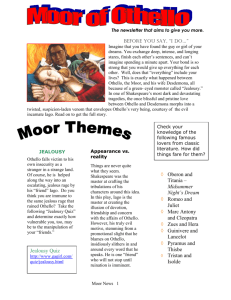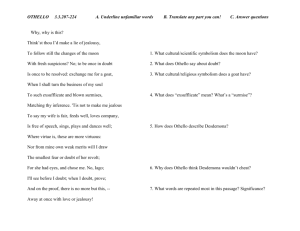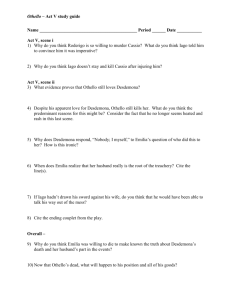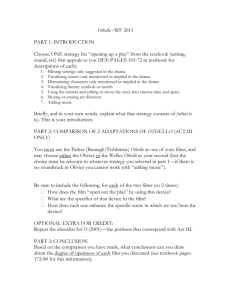Shakespeare Sunday - St. Lawrence Shakespeare Festival
advertisement
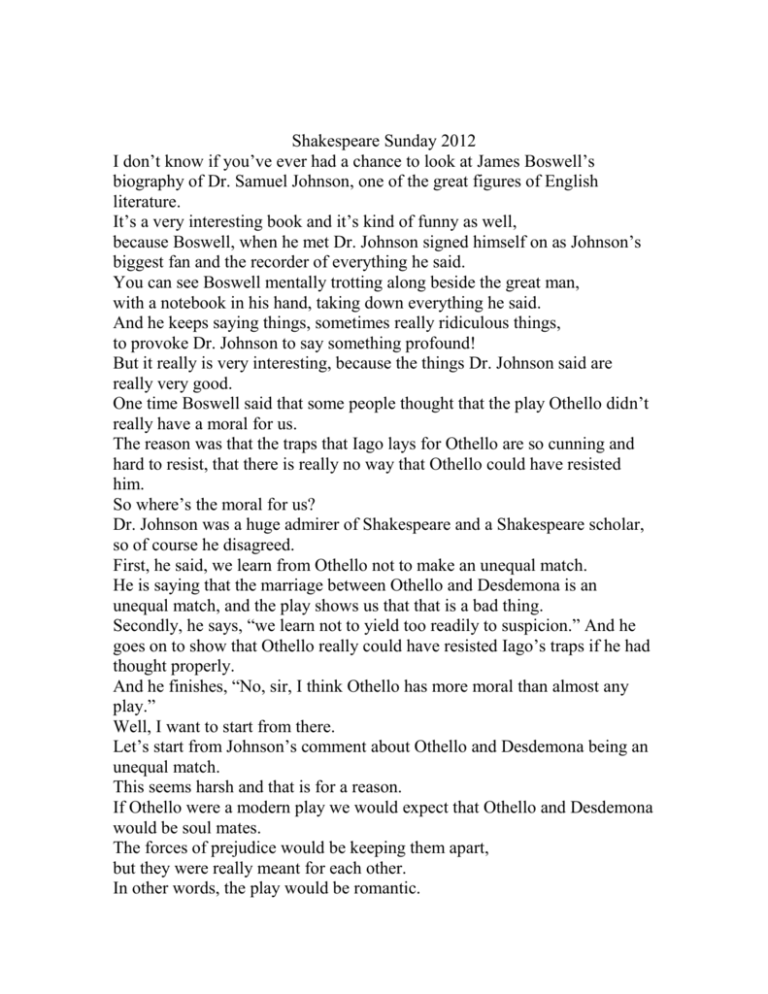
Shakespeare Sunday 2012 I don’t know if you’ve ever had a chance to look at James Boswell’s biography of Dr. Samuel Johnson, one of the great figures of English literature. It’s a very interesting book and it’s kind of funny as well, because Boswell, when he met Dr. Johnson signed himself on as Johnson’s biggest fan and the recorder of everything he said. You can see Boswell mentally trotting along beside the great man, with a notebook in his hand, taking down everything he said. And he keeps saying things, sometimes really ridiculous things, to provoke Dr. Johnson to say something profound! But it really is very interesting, because the things Dr. Johnson said are really very good. One time Boswell said that some people thought that the play Othello didn’t really have a moral for us. The reason was that the traps that Iago lays for Othello are so cunning and hard to resist, that there is really no way that Othello could have resisted him. So where’s the moral for us? Dr. Johnson was a huge admirer of Shakespeare and a Shakespeare scholar, so of course he disagreed. First, he said, we learn from Othello not to make an unequal match. He is saying that the marriage between Othello and Desdemona is an unequal match, and the play shows us that that is a bad thing. Secondly, he says, “we learn not to yield too readily to suspicion.” And he goes on to show that Othello really could have resisted Iago’s traps if he had thought properly. And he finishes, “No, sir, I think Othello has more moral than almost any play.” Well, I want to start from there. Let’s start from Johnson’s comment about Othello and Desdemona being an unequal match. This seems harsh and that is for a reason. If Othello were a modern play we would expect that Othello and Desdemona would be soul mates. The forces of prejudice would be keeping them apart, but they were really meant for each other. In other words, the play would be romantic. But Shakespeare is not being romantic, he is being tragic. He is being objective about the strengths and weakness of the relationship. And you know that it is striking that Jesus and the writers of the New Testament are not romantic about marriage – they are realistic. Well what about Desdemona? Tracey and I have both had quite a few friends who have married later in life. And it can be a little different because some of our friends seem to get some ideas in their heads that are not really very realistic. They get the idea of pairing up with people who are very different than they are. A very conservative dutiful guy will get the idea that the girl for him is a fashionable ultra-cool lady. And watching this, you are tempted to say to them, marriage is not meant to be an exciting way of finding out how the other half lives. Marriage may be an adventure, but you are really pushing your luck if you try to make it an exotic adventure. Well it seems that it was a little this way with Desdemona. She hears the tales of Othello’s life and falls in love with someone completely different than herself. It’s no wonder that her father thinks that Othello must have used witchcraft to win her. And Othello? Othello has lived the life of a hero. He has put his own self aside in order to live a life of military greatness. He has lived a life of courageous deeds. And when he finds someone who loves him for his deeds, he just accepts that. “She lov’d me for the dangers I had passed, and I lov’d her that she did pity them.” It is an unequal match because they do not stand on the same ground. Their marriage would have worked – even Iago is clear that Othello would have been a good husband. But there is little common ground between them and Dr. Johnson is right, their relationship is vulnerable. What about Johnson’s second point – that Othello falls too easily into suspicion. Why does Othello fall for Iago’s lies? And why his terrible jealousy? We have to consider what the people of Shakespeare’s time believed about human nature. In Shakespeare’s time people believed that reason ought to rule over the emotions, the passions. St. Paul in our New Testament lesson contrasts the works of the flesh with the fruit of the Spirit. The works of the flesh are things like “hatred, strife, jealousy, fits of anger, rivalries.” Just the sort of thing that Othello falls into in the play. The fruit of the Spirit are “love, joy, peace, patience, kindness, goodness, faithfulness, gentleness, self-control.” The Elizabethans believed that God’s grace does is to lift us out of a life dominated by the passions to a life where our true perception of things, our reason, is able to rule. “Jealousy, fits of anger, rivalries” –these are passion ruling over reason. “Love, peace, patience, self-control” – these are reason ruling over the passions. In the play, Cassio provides an example of this view of human nature at work. After he gets drunk and violent, after Iago lures him to get drunk and violent, his shame is that he has turned away from what is truly human in himself. “O God, that men should put an enemy in their mouths to steal away their brains, that we should with joy, revel, pleasure and applause transform ourselves into beasts.” The image of God in humanity is our reason. That is what places us over the beasts, and when we allow our passions to rule, we deface that image. Othello acknowledges the same thing when he starts to get angry at Cassio’s drunkenness and the disruption of the town: “Now by heaven my blood begins my safer guides to rule, and passion having my best judgement darkened trys to lead the way.” He is afraid that he is going to “lose it” as we say. And Othello considers himself to be, and others consider him to be, someone remarkable for not losing it. He has a very strong character, the rule of reason in him is very strong. But he is up against Iago, who aims to undermine his ruling reason. He says his plan will put Othello into “a jealousy so strong that judgement cannot cure.” This he will do through the strength of Othello’s love for Desdemona. He says, “His soul is so enfettered to her love, that she may make, unmake, do what she list, even as her appetite shall play the god with his weak function.” Iago seems to think that Othello is weak-minded, but he is not. In fact both Othello and Iago are remarkable for being strong-minded in different ways. Othello is remarkable having a “cool head under fire.” His reason rules even when it is assaulted by fear. Othello must have a very aggressive nature to be the warrior he is. But to be the commander he is, he must have a great deal of control over it. Iago is remarkable, although in a sinister way. He can enter into the lives of people around him and be taken for a regular, an honest man, and all along conceal his purposes. It’s amazing how many people consider Iago to be their friend! He is a manipulator. He is a bit like a salesman in a jewelry shop who sympathizes with engaged couples as they shop for an engagement ring, and uses his sympathy to get them to spend more money. So in a way both Othello and Iago are remarkable for the way their reason rules over their passions, but the example of both of them shows that this is a dangerous business. Iago’s kind of self-control makes him cold, calculating and evil. And what about Othello? Othello has devoted himself to being a hero, and he has found someone who loves him for that. Most people win love by trying to be what the person we love will admire. We adjust to what it is that others love in us. And they adjust to us. And because we both do that, we know where we stand with the other person. We have learned the forms that love takes in our relationship. But Othello has never changed to win Desdemona’s love. She loves him for being the hero he is. So they haven’t really gotten to know each other in their love. We might suppose that Desdemona’s love has touched a needy emotional side of Othello that he knows very little about. So his love for her is very strong but his understanding of her is not very strong. It is understandable. We would all like to be loved for being the hero that we would like to be. But in many ways we are on safer ground if we connect to our loved one through the non-heroic parts that we mainly are. So what happens? Iago convinces Othello that he does not have Desdemona’s love, that she has betrayed him. He never had very strong reasons in himself to know that he had it. And both his great strength and his need feed the “green-eyed monster” jealousy. He says, “She’s gone, I am abused, and the relief must be to loathe her.” He feels rejected in the emotional side that he is not very confident in, and the aggressive side that is his strength takes over. As the rest of the play unfolds, it shows us most vividly the horror of reason being held captive to passion. There is a passage in the Epistle of James that came to mind in watching the play. He is talking about how people use their tongues, their speech to destroy people and he says: “My brothers and sisters, these things ought not to be so” Each time I saw Iago go from lie to lie, I thought, “These things ought not to be so”! This is our reaction to Iago. We recoil. “These things ought not to be so.” When Othello falls from love, into jealousy and unreason, we feel: “These things ought not to be so.” Our minds and hearts recoil seeing the reversal of the true order of things. Passion ruling reason affects us as a kind of monstrosity. The predicament of the tragedy is that we have to rise above our animal nature to be truly human but this can go very wrong. The passions can turn into something monstrous. To try to summarize I want to direct your attention to the Shakespearean sonnet which is found on the yellow sheet in your bulletin. It comes as close as you can come in fourteen lines to giving the theme of the play. “They who have power to hurt, and will do none, That do not do the thing they most do show, Who, moving others, are themselves as stone, Unmoved, cold and to temptation slow.” That part is about Othello, whose great spirit enabled him to be both a great leader and a man not easily provoked to passion. “They rightly do inherit heaven’s graces, And husband nature’s riches from expense; They are the lords and owners of their faces, Others, but stewards of their excellence.” Those who are able to rule over their passions they are the true “lords and owners of their faces.” Others are blown here and there as their passions move them. “But if that flower with base infection meet,” “The basest weed outbraves his dignity: For sweetest things turn sourest by their deeds; lilies that fester smell far worse than weeds.” Iago is infected with base infection from the beginning of the play, Othello catches an infection from him. In Othello and in Iago too, we see lilies festering, rotting, and smelling worse than weeds. We see commanding natures whose ruling reason becomes ruled by passion, and the result is tragic. Nor does this only happen in fiction. I don’t like to use public figures as examples, but the example of Tiger Woods, the golfer, comes to mind. Why would someone who was one of the most admired athletes in the world, a man with vast amounts of money and great public esteem, spoil it all with an affair. And he is someone whose sport requires the coolest kind of self-control. No wonder that the Elizabethans believed and Scripture tells us, that it is only when we have profoundly denied the rule of passion, and allowed the Holy Spirit to rule within us, that these things can truly come out right. In this effort, the tragedy of Othello can help us. When we hear about someone’s personal tragedy that can help prick the inflated resentments and inflated jealousies that nag at us. It can humble us and return us to ourselves. And with a play, no one has to suffer for it! It is fiction. There never was such a person as Othello, or Iago, or Desdemona! Such fiction is good for us. Watching Othello we are reminded of how reason must rule the passions. We see the difficulty that passion can sneak back in and use our human frailties against us. And as we reflect on these things, we trust that God pities those human frailties. And we hope that by his Spirit lift us up until we are truly the “lords and owners of our faces.” I hope you go and see the play. I agree with Dr. Johnson. “I think Othello has more moral than almost any play.”



